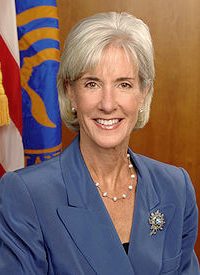
The National Health Service Corps (NHSC), a federal program that administers scholarships and loan repayment programs to government-approved medical professionals, has nearly tripled in size, the U.S. Health and Human Services (HHS) Department announced Thursday. During the announcement, HHS Secretary Kathleen Sebelius (left) declared that 20 percent of Americans live in "underserved" medical areas, and that NHSC ensures these populations have access to quality healthcare services. "When you don’t have access to primary care, small health problems grow into big ones. Chronic conditions that could be managed spiral out of control," asserted Sebelius. "Here in America, no one should go with[out] the care they need just because of where they live."
To obtain a scholarship or loan repayment program, a student or physician must agree to provide medical, dental, or mental health services for individuals residing in areas where medical care is not freely available. Through the program, awards are dispersed to applicants who agree to practice in these government-administered territories and adhere to specific HHS guidelines.
Thanks to a generous conglomerate of taxpayer-funded resources — ObamaCare, the 2009 stimulus bill, and HHS budget appropriations — in 2011 HHS awarded 247 scholarships, totaling $46 million, and more than 5,400 loan repayment programs, adding up to $253 million. Thus far, taxpayers have forked over a whopping $900 million, spiking the number of NHSC-dependent physicians from 3,600 in 2008 to more than 10,000 this year.
"Thanks to the National Health Service Corps, more Americans can see a doctor and get the health care they need," the HHS Secretary boasted. "The investments we made are improving health and creating access to care, fueling economic activity nationwide."
Sebelius affirms that NHSC’s stated mission is to equip "underserved" areas with healthcare services by providing government assistance to medical professionals. Although some may say such a question borders on conspiracy, many observers wonder if the NHSC’s massive expansion over the past three years may be attributed to the administration’s burning desire for socialized medicine. After all, they say, the President has in the past affirmed that he is a "proponent" of single-payer healthcare.
Under the NHSC program, the federal government offers grants and loans only to doctors agreeing to abide by specific disciplines and guidelines. In other words, if they want the money they have to play by the government’s rules.
Many analysts and research organizations are predicting that as ObamaCare matures, the United States will suffer from severe doctor shortages. The American Association of Medical Colleges predicts the country will see a shortfall of more than 150,000 physicians within the next 15 years.
Naturally, doctor shortages will result in more "underserved" areas, which in turn could lead to more federal grants, more government oversight, and inevitably, an expansive physician workforce that is wholly dependent on the federal government. Dr. Russell Blaylock, an author, editor, and board-certified neurosurgeon, told Newsmax in 2009 that he envisions the day when medical schools "will have to get federal approval, that they will appoint professors and set curriculum for the schools and they will direct residence and intern-training programs and set curriculum for these training programs."
If such a scenario comes to pass, the 10,000 physicians now under the NHSC program may turn to 50,000, or maybe 100,000. With that said, doctor shortages may not be such a bad thing for single-payer proponents. After all, more "underserved" areas, means more government oversight and more progress toward socialized medicine. As Obama’s former White House Chief of Staff, Rahm Emanuel, observed in 2008, "You never want a serious crisis to go to waste."



